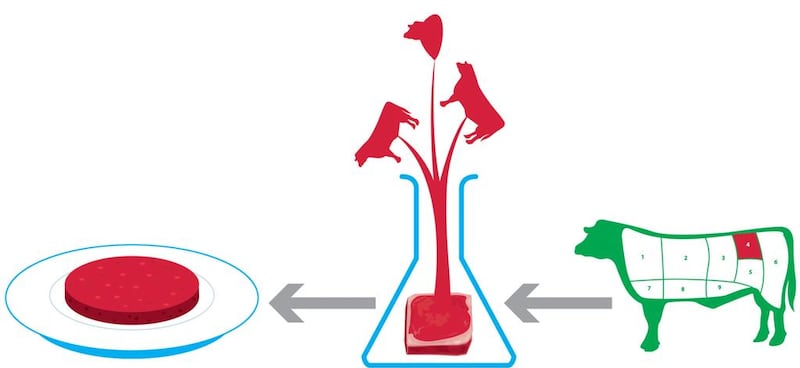The mechanics of 20th-century capitalism proved effective at divorcing most of us from any direct contact with the processes that bring our food into being. Where were the vegetables you ate last night grown? Where, and how, was the cow reared? Chances are, you haven’t got a clue.
In response, 20th-century people developed a set of ideological positions on food that are still playing out today. It’s a commonplace, for example, that there are two kinds of vegetarian: those who don’t eat meat simply because they don’t like it and those who don’t because of intellectual concerns over the ethics of meat, or, more likely, meat production. Mass-farmed, antibiotic-stuffed, road-transported animals, so runs this argument, have unhappy lives and the folks from the latter group of vegetarians don’t want to play any part in the processes that cause this to happen.
But could the 21st-century see the emergence of technologies that render this long-held position obsolete?
Back in August, Google’s chief, Sergey Brin, announced that he was the financial backer of the world’s first lab-grown hamburger: Brin provided €250,000 (Dh1.25 million) to a team of scientists at Maastricht University, Netherlands, who aimed to create a lab meat that is biologically identical to beef. In the course of three months, the team grew 20,000 muscle fibres from cow stem cells; the fibres were then extracted and, with minute care, pressed together to form a hamburger.
Brin says he funded the research for reasons of animal welfare. Speaking of modern farming methods, he said: “When you see how these cows are treated, it’s certainly not something I am comfortable with.”
So will McDonald’s be serving a McLab meal any time soon? And why would we want that? Brin certainly seems to think lab-grown meat can become a reality soon; he likes to invest in technologies that are “on the cusp of viability”.
As for the why, look at the demographics. The population of our planet is set to rise to 9.5 billion by 2060; we need to feed all those people and, chances are, most of them will want to eat meat. Rearing animals for meat, though, is a startlingly inefficient use of resources: around 30 per cent of the Earth’s surface is already covered by land used to pasture animals, against 4 per cent used to grow food directly eaten by humans. What’s more, all those cows account for 40 per cent of the world’s methane emissions: fuelling the greenhouse effect.
Lab-grown meat promises a future in which we can enjoy meat free from guilt over its effect on the planet, or any suffering endured by the animal during its life.
So, the crucial question: will lab-grown meat be as good as the real thing? In August, Brin’s lab-grown burger was eaten by a team of food experts in London. The verdict of the food critic Hanni Ruetzler? “Close to meat, but not that juicy.” Her colleague, Josh Schonwald, said: “The mouthfeel is like meat. I miss the fat, there’s a leanness to it, but the general bite feels like a hamburger.”
So there you have it. The world’s first truly guilt-free hamburger is around the corner. Until then, you can always buy one for €250,000.
David Mattin is the lead strategist at trendwatching.com
Follow us @LifeNationalUAE
Follow us on Facebook for discussions, entertainment, reviews, wellness and news.






